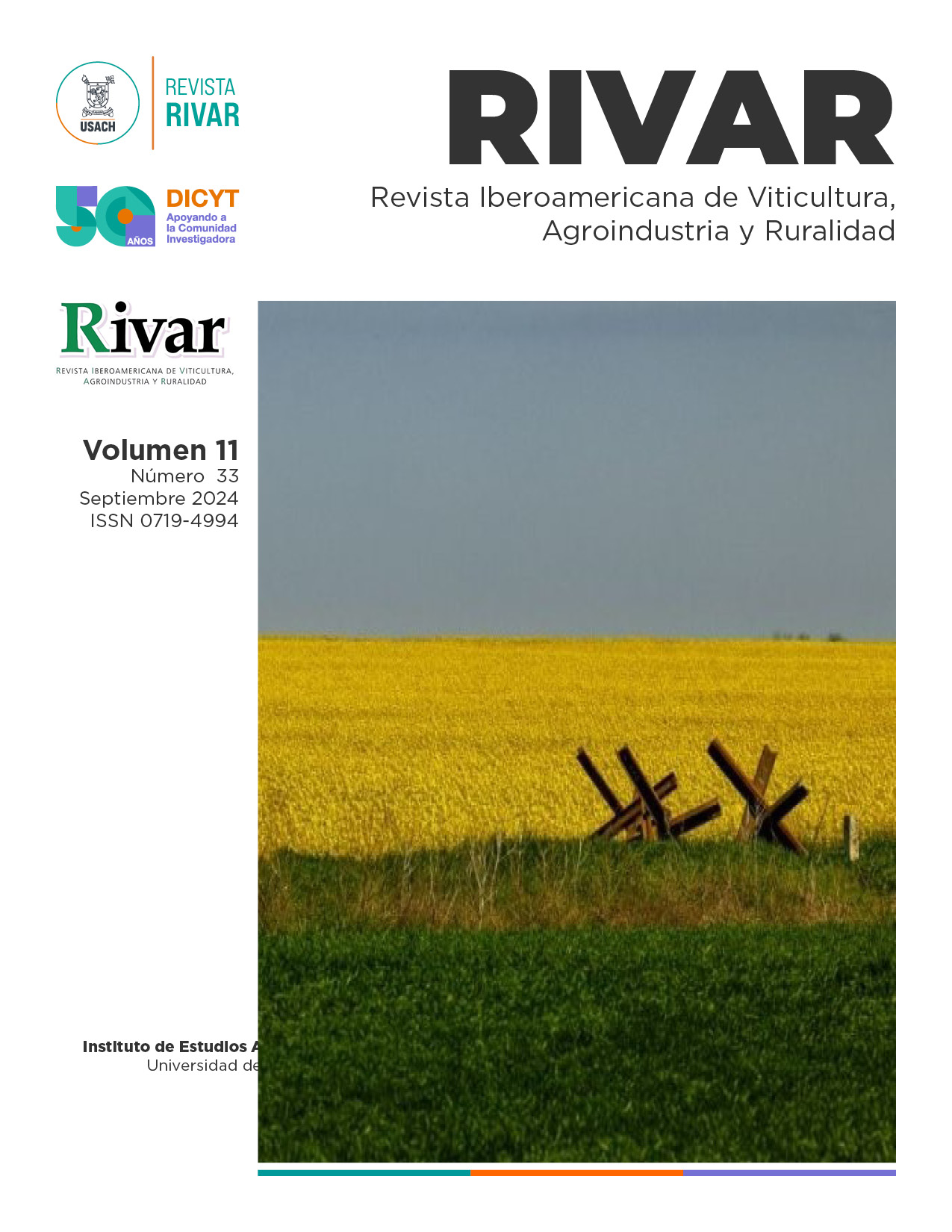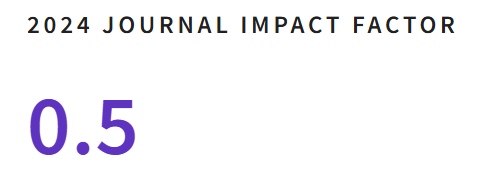Pluriverse (Neo)Peasant: Knowledge and Care of the Wineries in Climate Vulnerability Scenarios in Chile
DOI:
https://doi.org/10.35588/rivar.v11i33.6333Keywords:
wineries, knowledge, care, pluriverses, climate resilienceAbstract
In the context of the global climate crisis and the mega-drought that affects rainfed agriculture in the south-central zone of Chile, this article analyzes the peasant vineyard as a historical and collaborative common, resulting from traditional and agroecological knowledge and practices. That represents a pluriverse for local climate resilience, amid multiple spoils and enclosures associated with agro-industrial viticulture and corporate forest plantations. The document analyzes how the small vintners of the Itata and Cauquenes valleys protect their heritage, from an interdisciplinary perspective, which integrates contributions from geology by evaluating the biophysical manifestations of climate change in these valleys, considering Social Sciences with an analysis of the practices of care and production of the wine commons) and Law (evaluating the possible legal frameworks for the care and defense of the vineyard). All these actions are integrated from the approach of political ecology and climate justice, from which it is proposed that the peasant vineyard is an activity that protects the territory, the cultural heritage, and the socio-environmental well-being of the communities, in the context of climate change.
Downloads
References
Altieri, M. y Nicholls, C. (2013). Agroecología y resiliencia al cambio climático: Principios y consideraciones metodológicas. Agroecología, 8, 7-20.
Álvarez-Garretón, C., Mendoza, P.A., Boisier, J. P., Addor, N., Galleguillos, M., Zambrano-Bigiarini, M., Lara, A., Puelma, C., Cortes, G., Garreaud, R., McPhee, J. y Ayala, A. (2018). The CAMELS-CL Dataset: Catchment Attributes and Meteorology for Large Sample Studies – Chile Dataset. Hydrology and Earth System Science, 22, 5817-5846, https://doi.org/10.5194/hess-22-5817-2018
Bahamonde, M., Mariángel, P. y Hernández, M. (2016). Viñas y toneles del Itata. Patrimonio, memoria e identidad en la producción del vino pipeño. CETSUR.
Bollier, D. (2008). Los bienes comunes: Un sector soslayado en la creación de riqueza. En S. Helfrich (Comp.), Genes, bytes y emisiones. Bienes comunes y ciudadanía. Böll.
Buzzeti, C. (2019). Boletín del vino. Producción, precios y comercio exterior. Avance a julio de 2019. ODEPA.
Colmenares, A.M. (2012). Investigación-acción participativa: Una metodología integrada del conocimiento y de la acción. Voces y Silencios Revista Latinoamericana de Educación, 3(1), 102-115. https://doi.org/10.18175/vys3.1.2012.07
Díaz, I. (2020). Producción vitivinícola en el Secano del Chile Central. Boletín INIA n° 418. Instituto de Investigaciones Agrarias, Ministerio de Agricultura.
Gibson-Graham, J., Cameron, J. y Healy, S. (2013). The Back the Economy. An Ethical Guide for Transforming our Communities. University of Minnesota Press.
Giraldo, O. (2018). Ecología política de la agricultura. Agroecología y postdesarrollo. ECOSUR.
Gutiérrez, R. (2016). Horizontes comunitario-populares. Producción de lo común más allá de las políticas Estado-céntricas. Traficantes de Sueños.
Harvey, D. (2011). The Enigma of Capital and the Crises of Capitalism. Profile Books.
Hess, Ch. y Ostrom, E. (2007). Understandins Knodledge as a Commons: From Theory to Practice. MIT Press.
Jerez, B., Cid, B., Oliveros, V., Henríquez, A., Letelier, E. y Vanhulst, J. (2023). Wineries in the Itata and Cauquenes valleys: Local Flavors, Multiple Despossessions and Care for the Commons as Pluriverses for (Neo)Peasant Climate Resilience. Environment and Planning E: Nature and Space, 7(2), 862-881. https://doi.org/10.1177/25148486231185235
Jerkovic, M., Skewes, J., Duhart, F., Mujica, F. y Lacoste, P. (2021). Viñas patrimoniales y vinos naturales de Chile: El legado mestizo gótico-mapuche. Revista Austral de Ciencias Sociales, 42, 349-371. https://doi.org/10.4206/rev.austral.cienc.soc.2022.n42-19
Kothari, A., Salleh, A., Escobar, A., Demaria, F. y Acosta, A. (2019). Pluriverso: Un diccionario del postdesarrollo. Icaria.
Lacoste, P. (2021). La variedad de Uva país (Listán Prieto) en el Cono Sur de América: Trayectoria histórica. Idesia (Arica), 39(2), 75-84. http://dx.doi.org/10.4067/S0718-34292021000200075.
Lacoste, P. et al. (2016). Asoleado de Cauquenes y Concepción: Apogeo y decadencia de un vino chileno con Denominación de Origen. Idesia (Arica), 34(1), 85-99. http://dx.doi.org/10.4067/S0718-34292016000100010
Laval, Ch. y Dardot, P. (2015). Común. Ensayo sobre la revolución en el siglo XXI. Gedisa.
Melossi, A. (2013). Las denominaciones de origen sobre vinos en Chile. Una revisión crítica. En VV.AA. Los retos actuales de la propiedad intelectual: Visión latinoamericana. Thēmis y Pontificia Universidad Católica del Perú.
Navarro, L. y Pereira, H. (2015). Towards a European Policy for Rewilding. En H. Pereira y L. Navarro (Eds)., Rewilding Europeans Landscapes (pp. 205-223). Springer Open. https://doi.org/10.1007/978-3-319-12039-3_11
Negri, A. y Hardt, M. (2010). Commonwealth. El proyecto de una revolución del común. Akal.
Pardo, M. y Ortega, J. (2018). Justicia ambiental y justicia climática: El camino lento pero sin retorno, hacia el desarrollo sostenible justo. Barataria. Revista Castellano-Manchega de Ciencias Sociales, 24, 83-100. https://doi.org/10.20932/barataria.v0i24.415
Pizarro, J., Vergara, P.M., Rodríguez, J.A., Sanhueza, P.A. y Castro, S.A. (2010). Nutrients Dynamics in the Main River Basins of the Centre-southern Region of Chile. Journal of Hazardous Materials, 175, 608-613. https://doi.org/10.1016/j.jhazmat.2009.10.048
Pszczolkówski, P., Rojas, G. y Lacoste, P. (2021). Viñas patrimoniales en Chile: La corriente principal. OS Opificio della Storia, 2(2), 44-61. https://doi.org/10.6093/2724-3192/8252
Tapia, P. (2015). El yeti y la identidad del vino. En R. Aravena (Ed.), El patrimonio vitivinícola en Chile. Aproximaciones a la cultura del vino en Chile (pp. 19-26). Biblioteca Nacional de Chile.
Torremocha, E. (2011). Los sistemas participativos de garantía. Herramientas ed definición de estrategias agroecológicas. Agroecología, 6, 89-96.
Van der Ploeg, J. (2010). Nuevos campesinos. Campesinos e imperios alimentarios. Icaria.
Vergara, A. (2019). Cuando la comida es poca, venga la copa. Trabajo y producción de vino en Chile 1880-1950. En P. Herrera y J.C. Yañez (Coords.), Alcohol y trabajo en América Latina. Experiencias económicas, políticas y socioculturales (pp. 43-76). América Latina en Movimiento.
Yañez, L. (2019). Región de Ñuble. Información regional 2019. ODEPA.









